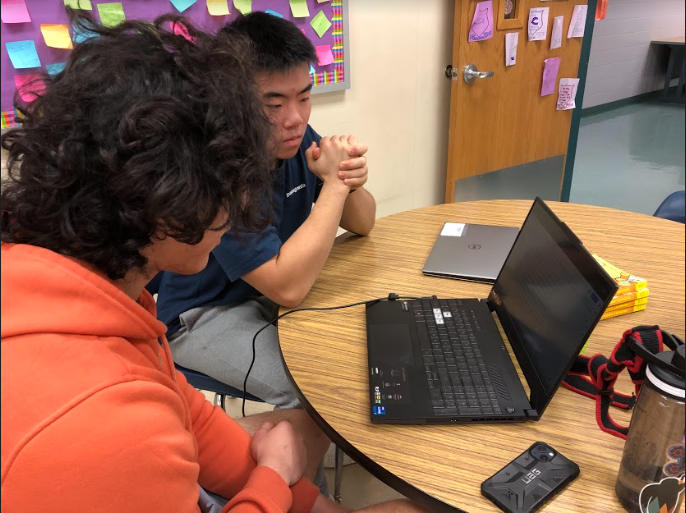Writing Center sharpens students’ skills during Charger Time
Senior Connor Park reads over senior Navid Jawid’s essay. Peer tutors are able to provide one-on-one help for students who come in during Charger Time.
January 23, 2023
On average, students attending college will have to undertake around 12 essays per semester, according to HowToLean.com. Practicing and establishing the fundamentals of writing in high school has helped many students succeed in college. One resource that can help students improve these skills is the Chantilly Writing Center (CWC).
Located in room 226, the CWC is run by English teacher Nicole Lehman. The center provides a spot open to all non-directed students looking to improve their writing in English, history or any other class during Charger Time (CT).
“What I’ve noticed, and I’ve been very pleasantly surprised over the years, is that students come in and see that it is really meant to be a comfortable and non-threatening experience,” Lehman said. “I know that talking about our writing makes us vulnerable sometimes and it’s not always easy.”
The CWC can be a helpful tool for every student, regardless of grade level. Experienced peer tutors are able to assist students with any writing assignment despite any difficulty or rigor.
“We see a lot of ninth and 10th graders just because they’re sort of getting used to high school writing,” Lehman said. “College essay season we’re really packed with lots of kids coming in.”
During CT, students have the chance to revise an essay, DBQ or any other writing assignment with the teacher or a student assistant. These student assistants are personally selected by their English teachers and then interviewed by Lehman and other older peer tutors.
“I think the best part about being a tutor is just getting to help kids and seeing them improve and understand new things,” CWC tutor and sophomore Jack Morgan said. “We do also get service hours, which is a nice benefit, but I think it’s actually nice to serve a positive role in the school community, helping other kids.”
Peer tutors are required to help in the CWC at least once a month; however, students such as senior Connor Park help three or four times a month.
“Students are able to get their writing reviewed, and they get insight into how they can become a better writer,” Park said. “But, besides that, I think it’s just a good place to connect with other students.”
Students who visit the CWC have the option of choosing the person they are paired with, allowing for them to grow a bond with a specific tutor over many CT periods. On the other hand, some tutors such as junior Eva Jaber have found that getting to view different styles of writing can help improve her own work.
“I think being a peer tutor has made me more open to things,” Jaber said. “Sometimes I’m tutoring someone, and I think, ‘oh my gosh, I need to implement that into my writing.’”
With hundreds of students situating themselves in the cafeteria and library for CT, Lehman proposes another benefit the CWC provides.
“I understand and appreciate the benefits from having students being able to have that time to relax and catch up with friends,” Lehman said. “However, I do think that having the CWC or any sort of meet up time with a teacher or peer during CT allows students to have more time after the school day to do what they want to do.”
Regardless of where students choose to reside for CT, the CWC will remain an option for those looking to connect with other young authors and maximize their writing abilities.
“I do think that once students come through our door, which can sometimes be the hardest part, they see that we’re an inviting environment for students to work on their writing.” Lehman said. “I feel like most students walk out with at least one tip or idea to help them feel better and more confident about their writing.”



